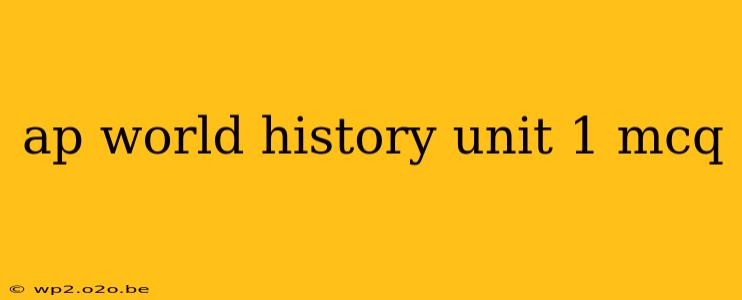Unit 1 of AP World History covers a vast and complex period, from the beginnings of human societies to the Classical Era. Mastering this unit requires a deep understanding of key themes, significant historical developments, and the ability to analyze primary and secondary sources. This guide will help you prepare for the multiple-choice questions (MCQs) by focusing on key concepts and providing effective study strategies.
Key Themes in Unit 1: A Foundation for Success
The College Board emphasizes several overarching themes throughout AP World History. Understanding these themes will not only improve your MCQ performance but also your overall understanding of the course material. In Unit 1, these themes are particularly relevant:
-
Human Interaction with the Environment: How did early humans adapt to their environments? How did agriculture and the development of settled communities impact the environment? Consider the impact of climate change and resource management.
-
Development and Interaction of Cultures: This theme explores how different cultures emerged, interacted, and influenced each other. Focus on the spread of ideas, technologies, and religions. Pay close attention to the diversity of cultures and the reasons for cultural exchange or conflict.
-
State-Building, Expansion, and Conflict: The formation of early empires and states is crucial. Analyze the political structures, military strategies, and expansionist policies of these early civilizations. Consider internal conflicts and external wars as well as the impact on their societies.
-
Creation, Expansion, and Interaction of Economic Systems: How did early economic systems develop? What role did trade and agriculture play in shaping societies? Understand the emergence of different economic structures and their impact on social classes and power dynamics.
-
Development and Transformation of Social Structures: Explore social hierarchies, gender roles, and the emergence of different social classes within early societies. How did social structures change over time? What factors contributed to social mobility (or lack thereof)?
Mastering the MCQ: Strategies and Practice
The AP World History exam's MCQ section demands a combination of knowledge recall and analytical skills. To excel, employ the following strategies:
1. Content Mastery: Beyond Rote Memorization
Don't simply memorize facts; understand the why behind the historical events. Ask yourself:
- What were the causes and consequences of this event?
- How did this event shape the future?
- What were the different perspectives on this event?
2. Process of Elimination: Narrowing Down the Choices
When confronted with challenging questions, systematically eliminate incorrect options. Look for inconsistencies, inaccuracies, or details that don't align with your understanding of the historical context.
3. Contextualization: Understanding the "Big Picture"
Each MCQ exists within a broader historical context. Consider the time period, geographic location, and relevant themes when evaluating the options.
4. Practice, Practice, Practice: Strengthening Your Skills
Utilize official AP World History practice tests and review books. These resources provide authentic MCQ examples and valuable feedback. Focus on analyzing your mistakes to identify knowledge gaps.
5. Time Management: Efficiency is Key
Develop a strategic approach to managing your time during the exam. Don't dwell on difficult questions; move on and return to them later if time permits.
Specific Topics to Focus On in Unit 1:
-
Early Human Societies: The Paleolithic and Neolithic periods, the development of agriculture, and the transition to settled life. Key regions: Mesopotamia, Egypt, the Indus Valley, and China.
-
Classical Civilizations: The rise and fall of empires like the Persian, Greek, Roman, Han, and Gupta empires. Key features: political systems, social structures, economic systems, religious and philosophical ideas.
-
Interaction Between Civilizations: Trade routes like the Silk Road and the impact of cultural diffusion. Examples include the spread of Buddhism and the exchange of goods and technologies.
By focusing on these key themes, mastering the strategies outlined above, and engaging in consistent practice, you can significantly improve your performance on the AP World History Unit 1 MCQ. Remember, consistent effort and a deep understanding of the historical context are vital for success.

